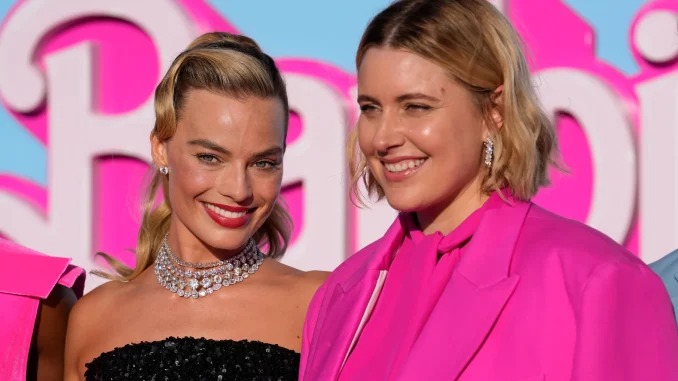
It’s been the year of a million pinks, billion dollar blockbusters, and apparently, hundreds of thousands of opinions about “Barbie.” So we’re adding yet another (and hopefully, final) one to the mix: The Academy Awards excluding Greta Gerwig from the Best Director category and Margot Robbie from the Best Actress race does not prove that Kens really do rule the world.
Let’s look at the facts: “Barbie” received eight Oscar nominations, including Best Picture, Best Adapted (er, yeah, that we have an issue with) Screenplay for Gerwig and Noah Baumbach, Best Supporting Actor for Ryan Gosling, Best Supporting Actress for America Ferrera, and a slew of crafts nods.
However, along with Charles Melton in “May December,” Penelope Cruz in “Ferrari,” and the “Priscilla” screenplay, “Barbie” was also “snubbed,” namely for lead star/executive producer Robbie and writer/director Gerwig in their respective categories of Best Actress and Best Director. When the nominations were announced, Twitter was set ablaze, as were the think pieces.
The issue is not that “Barbie” is too female-focused, too much of an audience-pleasing blockbuster, or too pink. It isn’t “too” anything. The film just apparently wasn’t enough for Academy voters to place it amongst the tough competitors in those specific categories of Best Director and Best Actress. It’s not a snub, they just didn’t make the cut. And to be clear, “Barbie” still got eight Oscar nominations — the fourth most of any film this year.
In fact, this year’s crop of nominees were among the most diverse ever in terms of race and gender. “Killers of the Flower Moon” star Gladstone made history as the first Indigenous woman to be nominated for Best Actress; “Rustin” actor Colman Domingo is the first Afro-Latino to be nominated for Best Actor and the first openly gay nominee in the category since Ian McKellen for “Gods and Monsters” 25 years ago; and Justine Triet is one of the few women to ever be recognized in the Best Director category. (However, note to the Academy, there’s no rule against having more than one female filmmaker recognized at a time, something they’ve only seemed to remember once in the group’s nearly 100-year history.)
“Barbie” isn’t the only tentpole film to lament the prejudices and sexism of the industry, either: “Priscilla” barely received funding despite Oscar-nominated auteur Sofia Coppola being behind it, and Ava DuVernay’s “Origin” tells the history of racism, and had to resort to launching a grassroots marketing campaign.
Lest we forget, also, that the Warner Bros.’ campaign for “Barbie” initially obscured its feminist message, leaving it as a “surprise” for theatergoers. The marketing campaign that undercut its feminist storyline led to directors like Oliver Stone calling the film an “infantilization” of storytelling before watching it. (Stone later apologized upon actually seeing “Barbie,” saying that he “appreciated the film for its originality and its themes” and “found the filmmakers’ approach certainly different than what I expected.”)
That general expectation, encouraged by the trailers and press talking points from those behind “Barbie,” may have even allowed Academy voters to too easily write off the ensemble film as just a crowdpleaser or blockbuster, regardless of its deeper message.
Mattel Films head Robbie Brenner told Time magazine outright that “Barbie” was “not a feminist movie.” Warner Bros. president of worldwide marketing Josh Goldstine added to The Guardian that the “Barbie” marketing rollout was akin to “running a presidential campaign,” with its international success “satisfying a need that the audiences feel in terms of being seen.”
Hillary Clinton, AKA someone who actually did run a presidential campaign, weighed in on “Barbie” being iced out of those two core Oscar categories, tweeting, “Greta & Margot, while it can sting to win the box office but not take home the gold, your millions of fans love you. You’re both so much more than Kenough. #HillaryBarbie.”
“Barbie” actress and newly-minted Academy Award nominee America Ferrera admitted she was “incredibly disappointed” that Gerwig and Robbie did not receive recognition in the directing and acting categories. But it’s probably safe to assume Best Actor nominee Jeffrey Wright and Best Supporting Actor nominee Sterling K. Brown are disappointed that their director, Cord Jefferson, isn’t up for Best Director for “American Fiction.” Celine Song probably doesn’t feel great that she and her star Greta Lee are not in the running for Best Director and Best Actress, despite “Past Lives” landing Best Picture and Best Original Screenplay nominations.
The embodiment of all “Barbie” parody patriarchy, AKA Ken himself (Ryan Gosling) graciously issued a statement in response to his own Best Supporting Actor nomination. Gosling was sure to credit Gerwig and Robbie’s vision for the film, and the post came after online backlash to Ken being heralded over Barbie herself. But it’s not as if Gosling was nominated for Best Lead Actor; no one is declaring him the lead of the “Barbie” movie.
But that cultural narrative that so many seem steadfastly to believe is undermining Ferrera’s nomination, and while Robbie and Gerwig (along with a slew of other actors and directors) deserve to be recognized for their “Barbie” filmmaking feat, it doesn’t mean the Academy has to do anything. There were a lot of great movies last year.
And guess what? Robbie and Gerwig were nominated, just not maybe in the categories that people wanted them to be: Robbie is nominated as a producer of “Barbie” in the Best Picture category (if it were to win, she would receive a statuette, as producers always do in that category), and Gerwig is nominated for Best Adapted Screenplay.
Sure, there’s irony to be found with a perceived awards snub of a movie about women being overlooked, but, if anything, the most upset Barbies might need to rewatch the film, because Gerwig’s movie also mocks the absurdity and hypocrisy of mega-corporations. That includes the Hollywood industrial complex. “Barbie” is bigger than all that.
SOURCE: IndieWire

